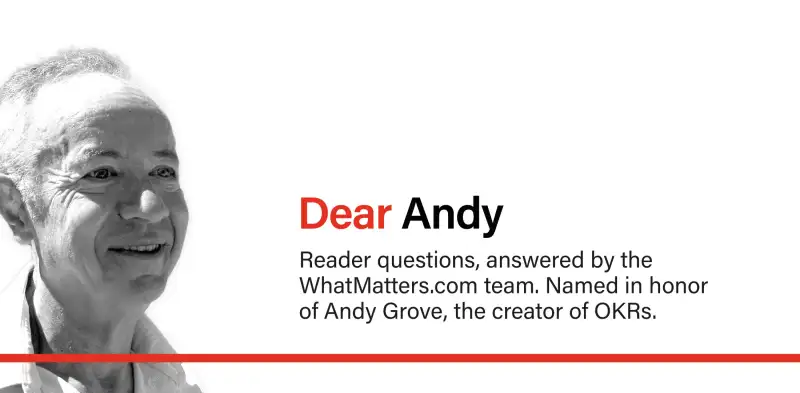Dear Andy,
I recently took over a semiconductor development team of approx. 100 people and am trying to implement our first set of OKRs. Recently, due to complaints from management and customers, we’ve found ourselves confronted with the problem that our projects take way too long!
We set a target to reduce the development time of our projects and I now want to turn this into OKRs. How does this sound for an Objective:
O: Get Projects done within 24 months.
I have some doubts as to whether the Objective (less than 2 years) is actually a good Objective at all or if it wouldn’t work better as a Key Result. It looks very measurable and “engineering like“ to me. Can you help?
Sincerely,
Marcus

Hi Marcus!
Thanks so much for writing in. I’m thrilled to see you’re implementing OKRs onto your semiconductor team. OKRs were actually created by Andy Grove in the '70s as a means to “crush” the microchip market, so you are in very good company, my friend.
Your query raises some very important questions about the relationship between OKRs and deadlines. Mainly, do deadlines make good Objectives? Here are a couple of thoughts for you on the subject.
Your issue is one countless teams have faced before: Customers and management feel projects are taking too long. The most obvious solution, of course, is to get your projects done faster. However, with a deadline as your Objective, what you’re essentially telling your team is that their main goal, their purpose, and the reason you’re all there… is to “work faster.” Remember, your Objective should be a deeply personal and inspirational statement of purpose — a rallying cry, if you will. Having an arbitrary date as your Objective will only inspire your team to a very limited extent. Let’s dig a little deeper.
Have you been able to figure out why your projects take, to borrow a phrase, “too long?” Can you identify any solvable issues that you could focus on improving in the next 90 days? What barriers are causing this lag in productivity? Maybe there are too many layers to your approval process. Maybe your team members need better support with child care or lack sufficient set-up for remote work. The more clarity you can get about your hypothesis, the more effective your OKR will be.
Another question for you: Do all of your projects take too long? We know not all projects are created equal (some might legit need more production time, some more design, etc.) — is implementing a universal reduction in development time across the board helpful — or even necessary — for all departments? Perhaps there’s room to specify which projects will be evaluated for efficiency first. More to this point, can your team realistically deliver the same quality product in this new, reduced time frame? It’s possible that management needs more frequent updates on your team’s progress or insight into what can be “fast-tracked.”
In the end, it sounds like, your main goal here is happy customers and happy management. And while giving them exactly what they’re asking for is certainly one way to go about achieving it, there may be better ways to skin this particular cat. Henry Ford has been famously credited with saying “If I had asked people what they wanted, they would have said faster horses.” He was able to take his customer’s wants (faster horses) into consideration to identify what they need (a better way to get around). When you’ve found your team’s “better way to get around,” that’s when you’ve found your Objective.
Well, Marcus, I hope this has been helpful for you. Thanks again for writing in and keep us updated on how OKRs are working for you and your team!
Sincerely,
Billy from the What Matters team

Have a question for Dear Andy? Click here to submit your OKR queries.
